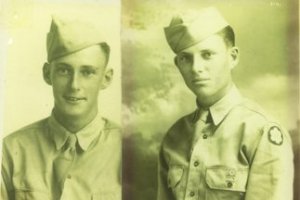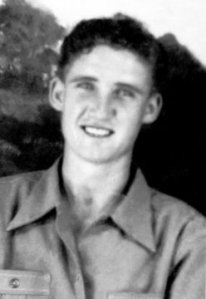20/365 – Honoring – Bill and Jack Morris
Newton County resident Bill Morris learned about Pearl Harbor at a movie theater in Social Circle. He recalled, “Uncle Sam pointed a finger at us from the screen and said, ‘I need you!’ Well, when we turned 18 he got us.”
Born in Bethlehem, GA in 1924, Morris, 4 of his brothers, plus 2 brothers-in-law, served in WWII. Morris said, “My twin brother and I were inseparable but the army sent me to Camp Crowder, MO and sent Jack to California. Our mother was seething.” Mrs. Morris wrote President Roosevelt and Secretary of War Stimson demanding the twins be reunited. They were. Bill and Jack fought the entire war side by side.
The Morris twins learned the art of stringing communications wire and mastered heavy weapons at Fort Leonard Wood, MO. “It’s not Missouri, it’s the state of Misery, if you ask me,” he said.
In Feb ’44 the twins boarded a Liberty ship for Birmingham, England. “We had a 2½ ton truck, our equipment, and I had a case of mumps,” Morris said. “I didn’t report to sick bay until we set sail. Jack and I were stayin’ together!”
After intense specialized training in England, the Morris twins boarded a LST and sailed across the English Channel on D-Day +1. “It was June 7, ’44,” he said. “We were among 5,000 ships at Omaha Beach and for some reason that night every gun in the fleet opened up. Jack and I had been taught to ‘get low and get in a hole’ but there ain’t no foxholes on a ship! The firepower was awesome.”
June 8, early morning: the twins, their crew, and 2½ ton communications truck hit Omaha Beach. “We strung wire beyond the rocky bluffs,” he said, “The bodies bothered us, hundreds of them, stacked like cords of wood.” Army engineers suddenly told Morris and his crew to ‘back off’ to a safe area. “Land mines,” he said. “We moved far enough, I suppose, before things got real ugly. A mine detonated, killing the engineers.”
At dusk lay danger. “I posted guards but the continuous gunfire kept us awake all night,” he said. “We slept in foxholes with tents pitched over them. We were mavericks; stringing wire wherever needed. I guess we looked strange, too, since we’d cut our hair into Mohawks for the invasion.”
Stringing wire from Omaha Beach to the Cherbourg Peninsula, dodging German 88mm artillery, returning north through France, Morris and crew eventually ended up in Belgium. “We’d slept in ditches, mud holes, hid behind trees, seldom even saw a town, but in Belgium they put us up in a castle that Kaiser Wilhelm used during WWI, our first dry floor in 3 months,” Morris said with a smile.
In Dec, ’44 while stringing wire at the German border in freezing cold and heavy snow, Morris and crew heard frantic orders from an American officer, “Move out, move out, we’re being overrun!” Approaching German Panzer tanks signaled the Battle of the Bulge.
Morris recalled, “We hustled back, but recruits fresh out of basic were ordered to stay with ineffective bazookas to stop the Panzers. Those boys didn’t make it out.”
Overcast skies, sub-zero cold; and thick snow worked to the Germans’ advantage.
“Our planes were grounded,” Morris said. “But on Dec 23 we awoke to a beautiful blue sky. Then they came, thousands of them, filling the sky with contrails. Our flyboys got the job done; the Battle of the Bulge was over.”
Morris recalled stringing wire on the German side of the Rhine River. “We were on the river bank,” he said. “Suddenly bullets were ‘pinging’ off a brick wall behind us. Well, we got low and got in a hole!” American sharpshooters on the opposite bank were shooting at German mines floating down the Rhine River. “Those boys were either lousy shots or their bullets were ricocheting off the water. Let’s hope it was ricochets!”
Morris and his crew were with American forces when they liberated the infamous concentration camp at Buchenwald. Morris softly recalled, “From a mile away you could smell it. What looked to be humans stumbled around like skeletal zombies. We found the meat hook conveyor line that ran bodies to furnaces, trenches filled with…that’s enough, I suppose. I’ve tried to forget Buchenwald, but it’s impossible.”
After Hitler’s demise, the twins and crew boarded a troop ship in Marseilles and set sail for the South Pacific island of Okinawa to train for the invasion of Japan. “We slept on the beach our first night,” he said. “In the morning about 75 Jap soldiers walked out of the jungle and surrendered to us. They had American cigarettes, C-rations, even American hand grenades. We sure were glad they were in a mood to surrender!” The lives of the Morris twins and feasibly a million other American casualties were avoided by two atomic bombs. Morris said, “Both wars were over. My brother and I were ready to see Georgia again.”
First Seattle; a train across America, a locomotive whistle blowing full blast from Chattanooga all the way into Atlanta in celebration, hitch-hiking a ride to Monroe Street in Social Circle, and home. Morris recalled, “I remember our mothers’ welcoming words to this day, ‘I’m so proud of you boys.’”
Morris took advantage of the benefits he’d earned overseas, finishing high school before attending business school for accounting. His last job before retiring from Sunbelt Builders in 1989 was completion of the Ginn Motor Company in Covington.
“I hope America never forgets the sacrifices,” Morris said. “The stacks of bodies at Hurtgen Forest, the paratrooper that crawled out of flooded fields behind Omaha Beach where he died in place, a man’s jet black hair turning white in 2 days, I saw too much and have too many memories, but the lord let me live, and I live for him.”
In 1998, 79 surviving veterans of Company B 32nd Signal Construction Battalion attended their reunion. In 2008, there were 7.
Pete Mecca – http://www.aveteransstory@gmail.com
Pete Mecca – Vietnam veteran, columnist, and free-lance writer
If you’d like to be considered for one of my featured newspapers articles
entitled “A Veteran’s Story” email me at: aveteransstory@gmail.com
You can review my articles at: rockdalecitizen.com or newtoncitizen.com
Click on ‘community’ then click on ‘military news’
Site Update
Please forgive me for letting so much time lapse between posts. I started a new job last week and just have to get a schedule set then I will be back to regular updates. Thank you all for your patience and please continue to send in your stories.
I received some sad news this morning from Milblogging.com I received some sad news earlier today that retired TOPGUN pilot US Navy Capt. Carroll LeFon, better known as Lex of the military blog Neptunus Lex, was killed Tuesday when a jet he was flying crashed at Naval Air Station Fallon in Nevada. Last year when he won Best U.S. Military Veteran Blog. You can visit his blog to read more about him, they have a post there about his passing and have left comments open for people to talk among themselves and pay their respects.
Our thoughts and prayers are with his friends and family. Our hearts are heavy with the loss of another great soldier. Rest in Peace Carroll.
19/365 – Honoring – Carl Hyde
Born atop the Ryo Mountain Ridge in Gordon County, GA, Conyers resident Carl Hyde was 2 years old when his farming family moved to Atlanta. “My father and brother went into business,” Hyde said. “But when dad passed away we ended up farming again in Jackson and Morgan Counties.” A graduate of Morgan County High School, Hyde and all 5 of his brothers were drafted during WWII. The oldest Hyde boy lost his life during the Battle of the Bulge.
“I was only 16 when the war started,” Hyde said. “So after high school I moved to Savannah to attend vocational school.” Working as a soda jerk in a local drug store to augment expenses, Hyde mastered airplane mechanics and eventually earned $128.00 per week. “Shoot, that was fantastic money back then,” he said. A good son, Hyde paid his mother’s debts before joining his siblings in uniform. “I talked mom into signing papers as soon as I turned 17,” he said.
Carl Hyde chose the United States Marines. He said, “I remember my first day at Parris Island, standing there in formation wondering ‘what the heck have I gotten myself into’?” After qualifying as a sharpshooter, Hyde received laid-back barracks duty while the rest of his platoon pulled mess duty. “Sharpshootin’ wasn’t hard for an ole’ Georgia farm boy like me,” he said with a smile. “After graduating from basic training, Sergeant Lathrop, our drill instructor, teased us, ‘You young’uns will be gettin’ your butts shot off while I’m sittin’ here drinkin’ beer!’ We’d get him back for that one.”
Sent home for a 10 day leave, Hyde eventually traveled via train to San Diego to board a troop ship with the 3rd Marine Division. Destination: retake the island of Guam.
“I had special weapons training,” Hyde said. “I drove an open-top half-track with 4 gunners on each corner manning 50 caliber machine guns, but we found out on Guam an open-top wasn’t beneficial on safety. The Japs lobbed hand grenades in, and we threw them back out. That’s sort of risky.”
Their half-track would be called into service to wipe out enemy fighting positions, normally pillboxes armed with machine guns or heavy weapons. Moving back after one engagement, Hyde got the surprise of his life. “Here comes my ole’ drill instructor, Sgt. Lathrop, marching into battle,” Hyde recalled, grinning. “I screamed at him, Hey, Sarge, while you’re up there gettin’ your butt shot off I’ll be back here drinkin’ beer! Payback is hell, they say.”
That night as Hyde backed the half-track into a protective cover of jungle growth, he felt a series of bumps under the treads. Not thinking anything of it, plus under orders not to move the half-track after dusk, Hyde and crew settled into a meal of K-rations and a little shut-eye. “An appalling smell awoke us,” he said. They’d backed over 7 dead Jap soldiers, obviously left in the jungle by their comrades. Guam was considered “secured” after 5 days of desperate fighting.
The Marines of the 3rd Division were told their next destination would be easy, no more than a 3 day push, and they may not be needed at all, on a rocky black sand Pacific island called Iwo Jima. “We were supposed to land on D-Day plus 3,” Hyde said. “Well, we were on that meat-grinder the 2nd day. My, God, what we saw, what we witnessed. I still have trouble talking about it.”
On Iwo Jima, Hyde and crew had a full-tracked 105mm howitzer, still manned by the same 5 guys. They fought across Iwo Jima for 31 straight days of combat. “We’d be called up, take out a pillbox, blast a rock formation or tunnel, then pull back. At night we tried to sleep. I don’t remember sleeping, and what I do remember about Iwo Jima I’ve tried to forget.”
Hyde and crew witnessed the famous flag-raising on Mount Suribachi. “After all the blood-letting on that island, ole’ Glory suddenly appeared fluttering in the wind atop Mount Suribachi. Good lord, you should have heard all the ship horns and hollering that went on in celebration.” Pausing, Hyde said softly, “I’ve seen the American flag burned on TV by our own citizens. If they’d been on Iwo Jima, well, they would understand the cost of that so-called free speech.”
Battle-weary and battle-hardened, the 3rd Marine Division sailed back to Guam to prepare for the up-coming invasion of Japan. “Those two atomic bombs saved us,” Hyde said. “Some people want to apologize for that. Are you kidding me? The war needed to end; the suffering and dying had to stop. We did the right thing.”
Instead of home, Hyde was shipped to China. “We were still needed in case the peace didn’t hold,” he said. “We were posted at a dinky outpost, but could at least go to a nearby town for food and drink.” Several times while walking into town the marines got caught between firefights of the Nationalist and Communist Chinese. Hyde recalled, “As soon as they saw we were Americans, they stopped the battle. We’d walk by; then they’d start killing each other again. A little crazy, I know, but so is war.”
All but one of the Hyde boys made it home. Carl Hyde eventually retired from 31 years with the GM Company in Doraville. His words of wisdom: “Every kid when they turn 18 should go through Parris Island, whether they serve or not. The country would be 100% better!”
Pete Mecca – http://www.aveteransstory@gmail.com
Pete Mecca – Vietnam veteran, columnist, and free-lance writer
If you’d like to be considered for one of my featured newspapers articles
entitled “A Veteran’s Story” email me at: aveteransstory@gmail.com
You can review my articles at: rockdalecitizen.com or newtoncitizen.com
Click on ‘community’ then click on ‘military news’
Related articles
- Looking Back At Iconic Iwo Jima (npr.org)
- From Our Files: Iwo Jima, Feb. 23, 1945 (csmonitor.com)
- Gunny G’s Marines History and Traditions: Patriotic Fervor and the Truth About Iwo Jima…By Karal Ann Marling and John Wetenhal (gunnyg.wordpress.com)
- One of the First Black Marines Recalls Iwo Jima (theroot.com)
- This Day in History: Marines Raise Flag on Mt. Suribachi (history.icanhascheezburger.com)
- “Uncommon Valor: The Battle of Iwo Jima” Coming to Mesa Public Library (ladailypost.com)
- Gunny G’s….The Flag Raisings – Lest We Forget! (gunnyg.wordpress.com)









